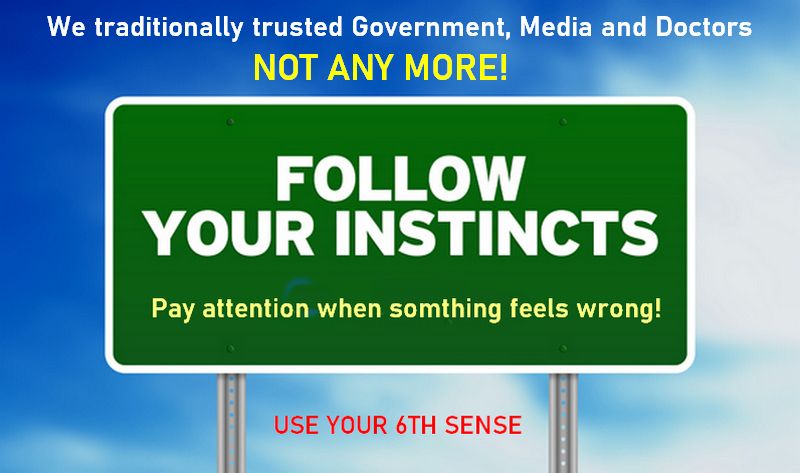How to Use Your Intuition when Everybody Lies?

Psychologytoday - Posted September 24, 2014, | Reviewed by Jessica Schrader
Steps for listening to your heart and gut when making decisions.
Do these statements sound familiar?
- “I should have trusted my gut.”
- “I knew what was really going on but I didn’t say anything.”
- "I wanted it so badly but I still walked away."
In its effort to protect you, to keep you alive and safe, your brain can keep you from speaking up or getting what you truly want if you don’t know how to listen beyond your rationalizations.
When you face an uncomfortable decision, your brain will spontaneously give you a fabulously credible rationalization for avoiding possible failure, embarrassment, or even minor discomfort. As humans, we are master rationalizers.
First, we tend to compartmentalize problems into two options, yes or no, do it or don’t, with the choice often being the easier way out. We rarely see the middle ground or the creative solution.
Second, we ignore what our hearts and gut are telling us. There are 100 million neurons and every class of neurotransmitters in your gut is used to process external stimuli and send signals to your brain. Your heart also receives input and sends out signals. The brain translates these signals so we can make decisions and act. It also edits, censures, and resists some of the data it receives especially if emotions are triggered.
We all have intuition but we don’t consciously listen to it, trusting only what appears to be rational in our often irrational minds.
Here’s how the centers break down: Your head brain reasons, analyzes, synthesizes, and makes meaning of what is perceived. Your heart and brain activate based on how the presenting situation relates to your dreams and desires, including your hopes, disappointments, and feelings of betrayal if you feel promises were broken. Your gut-brain reacts when your fear is triggered, whether the threat is real or you are just afraid of letting go of what you now have. This is also where you will feel the courage to act in spite of your fears.
Scientifically, these divisions are simplified because impulses in the neural network are constantly interacting; all parts of the nervous system overlap, making it hard to clearly define what controls our thoughts and actions. Practically, they make sense. Your tense shoulders, nervous stomach, and little smile are giving you clues all the time.
Alan Alda said, “At times you have to leave the city of your comfort and go into the wilderness of your intuition. What you'll discover will be wonderful. What you'll discover is yourself.”
Intuition is not from outer space; it’s from inner space.
Practice Exercise in Decision Making
Choose one decision you need to make now or in the future. Follow these steps:
1. Listen to your head. Be curious. Consider all options other than yes or no, do or don’t do. List out everything you might do that is in your control or ability to influence others to help you. Think about the facts. Consider the pros and cons. What points come to the forefront? What are all of your options around this choice you have to make?
2. Take a breath and clear your mind so you can listen from your heart. Think of someone you care about or something you love to do. Say the word love or gratitude or choose another word that opens your heart. Now consider the decision you need to make keeping your awareness around your heart. What points come to the forefront? How do these points differ from what emerged when you considered the decision using only your head? Notice how the points relate more to your desires than to the facts and details. Which option will you regret more if you don’t decide on it?
3. Take another deep breath and relax so you can listen from your gut. Make sure you are sitting up straight. Take a deeper breath into your belly. Recall a time you felt gutsy and determined in spite of your fear. Remember the moment you moved forward, took action, or spoke your mind. As you inhale, say and feel the word courage. Let the word settle into the core of your body as you exhale. Consider your decision one more time.
What points come to the forefront? What is the worst that can happen if the option you take doesn’t work out, really? How likely is the worst to happen? How painful will a failure be? What will you lose if you don’t try? How do these points differ from what arose when you were thinking through your head and heart? Maybe you recognized a real and valid reason for saying no or yes that wasn’t clear before. How does thinking through your gut impact your decision?
Before you make your decision, balance all the points that arose in the three steps of this exercise to confidently make the best choice with what you now know. Practice this exercise as often as you can to create the habit of listening to all three of your processing centers.
Depending on your personality, you will find it easier to access either your heart or gut over the other. People who tend to be helpers listen more easily from their heart than their gut. On the other hand, risk-takers who move quickly on instinct find it easier to listen from their gut than from their heart.
It is hard to know, really, if the action you take is going to have a good or bad outcome. However, there will be less regret if you make the decision instead of letting your protective, control freak brain do it for you.
Want to know more about how to use your intuition when in conversation with others? Check out my new book, The Discomfort Zone: How Leaders Turn Difficult Conversations into Breakthroughs.

Marcia Reynolds, PsyD., is the author of two leadership books, The Discomfort Zone and Wander Woman. She is the President of Covisioning, a leadership development firm.
COPYRIGHTS
Copy & Paste the link above for Yandex translation to Norwegian.
WHO and WHAT is behind it all ? : >
The bottom line is for the people to regain their original, moral principles, which have intentionally been watered out over the past generations by our press, TV, and other media owned by the Illuminati/Bilderberger Group, corrupting our morals by making misbehavior acceptable to our society. Only in this way shall we conquer this oncoming wave of evil.
Commentary:
Administrator
HUMAN SYNTHESIS
All articles contained in Human-Synthesis are freely available and collected from the Internet. The interpretation of the contents is left to the readers and do not necessarily represent the views of the Administrator. Disclaimer: The contents of this article are of sole responsibility of the author(s). Human-Synthesis will not be responsible for any inaccurate or incorrect statement in this article. Human-Synthesis grants permission to cross-post original Human-Synthesis articles on community internet sites as long as the text & title are not modified